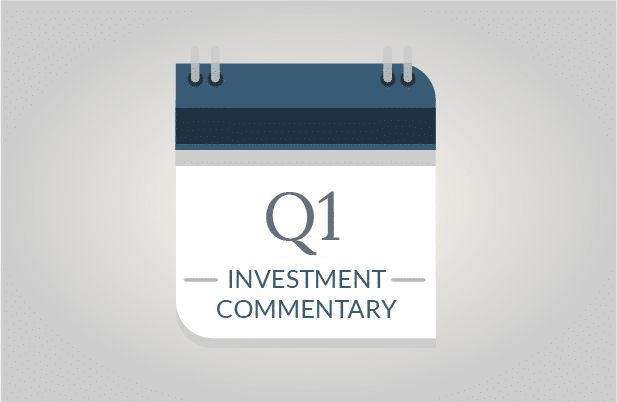SageVest Wealth Management’s latest quarterly commentary is now available. Highlights include:
- The coronavirus sieged the world in the first quarter of 2020.
- The longest bull market in history entered bear market territory in a matter of weeks.
- More than 80% of Americans are staying home, with numerous other countries following strict stay-at-home orders, all of which are sending shockwaves throughout the economy.
2020: The Coronavirus World Pandemic
We ended 2019 calling it a ‘year to celebrate’ and presenting the big questions of ‘Will the good times continue into 2020?’. Never did we imagine that the longest bull market in history would be upended so quickly by the global pandemic of the coronavirus, or COVID-19.
The stock markets literally went from all-time market highs into a full bear-market retrenchment, represented by a 20% or greater loss, in a matter of a few short weeks. The first quarter of 2020 was the worst first quarter for stock performance in history. It was also the fastest unwinding of broad financial markets ever witnessed.
On a positive note, stocks boomeranged from entering a bear market (down by 20% or more), back into a bull market (up by 20% or more) in the same week. Such a rapid reversal is evidence of hope during a time when virtually everyone is facing immense uncertainty.
It is virtually impossible to predict the future course of the virus and its impacts, medically, economically or financially. However, we will explore what we know, what we might expect, how we’re responding and financial strategies to consider.
Economic Toll Ahead
Just as the medical experts tell us that the worst is yet to come in terms of infections and deaths, we sadly know the same is true for the economic toll of the virus. In just two weeks, nearly 10 million Americans have applied for unemployment, setting all-time records. Millions of companies have closed their doors. Billions of people are staying at home around the world. No one has ever seen such a rapid economic impact.
The almost certain reality is that millions more Americans will lose their jobs and that some companies will go bankrupt. This is sadly inevitable.
Widespread Supportive Response
While the above realities are stark and dismal, the positive and heartwarming news is that we’ve seen a rapid and widespread response from both the private and public sectors. In a few short weeks, massive programs have been extended to help those who are sick, caring for children and impacted financially. The US government recently enacted the largest stimulus program in history, and more help is expected to emerge soon. The Federal Reserve has taken extreme monetary actions and is considering more support. Even private companies are stepping up to help. Bottom line, virtually everyone gets the fact that the impact will be immense, and that people, businesses and industries need a LOT of help. Will the help be enough for everyone? No. But will government programs and private sector offerings help? Yes.
Could We Be Entering A Depression?
There’s no formal definition of a depression versus a recession. However, could we be entering a deep recession that could be construed as a global depression? Perhaps. The world economy has basically buckled in less than a month, with no one knowing the timeframe of when billions of people will be able to emerge, return to work and begin living their “normal” lives again.
The above said, we think there are four primary considerations worthy of note, each giving optimism about the long-term, while being realistic about the short-term.
- Even if we look at the worst example of the Great Depression, which lasted close to a decade, there are dramatic differences today in technology, health care, productivity and more, each of which give a much stronger chance of a more rapid recovery in today’s day and age.
- Perhaps the most relevant experience was the Spanish flu of 1918. It lasted for about three years (which we do not predict to repeat), and what emerged next? The Roaring Twenties.
- The release of future pent up demand (delayed buying) is virtually inevitable post such a massive global shut down. People will eventually be forced to resume buying by necessity, if not pure desire.
- Furthermore, as stated earlier, we’ve already seen significant investor appetite to buy stocks, which led to a rapid bull market recovery in just days. Significant buyers will emerge again. Being one of them could be one of the smartest investment moves you could make.
Specific Investment Considerations And Our Actions
We preface the following with the fact that everyone’s finances are unique. There is no one-size-fits-all to investments or financial planning. However, key points that we feel are relevant are outlined as follows.
Financial Reserves For Expenses: The first place to begin in your finances is evaluating your emergency cash reserves relative to your expenses and projected income. Ideally, your reserves are adequate to sustain your expenses for several months, if not longer. If you have concerns about your job being at risk, greater reserves could be warranted and necessary.
One of our first actions at the onset of the crisis was to raise cash balances to cover at least one year’s worth of anticipated withdrawal needs. We strongly encourage clients to contact us if you expect higher cash needs this year, either due to higher expenses or a potential loss of income.
Securing Capital Preservation In Bonds: Bonds are debt instruments, or IOUs, issued by companies, governments and other institutions. They’re generally owned for income production, capital preservation and investment stability. However, bonds are subject to risk, particularly if the bond issuer might not be able to repay its debt. This concern has been growing among a number of bonds, even high-quality bonds. At the end of 2019, we discussed concerns about excessive corporate borrowing and associated risks. This is now a primary concern: Will companies be able to repay their debts with falling revenues? If you rely upon your bonds, this is an investment area that requires careful consideration.
We’ve always held bonds to cover at least five years of cash needs and have been dialing back on broad bond exposure in favor of cash and short-term Treasuries. While we still own broad-based bonds, we have pulled back to cover short-term cash needs and ensure the ability to buy stocks on market dips.
Opportunistic Stock Actions: Stocks are owned for long-term growth appreciation. They shouldn’t be counted on for covering your short-term expenses as they’re part of your long-term plan. The best strategies for stocks are to sell high and buy low. We fortunately trimmed stocks for clients as stocks rose, and now we’re buying stocks as they decline.
Trying to predict a market bottom is a fool’s game. As such, we’ve already staged some sequential buying, and anticipate doing so at different market levels. We hope we won’t touch new market lows, but if we do, our intention is to buy. The only twist on this is that we might also do some additional tax loss harvesting to trigger tax losses while keeping clients invested.
Looking Ahead
First and foremost, we wish you good health. Furthermore, we’re here to answer your investment or financial questions as they arise.
If you or someone you know is looking for updates about resources available, ways to help others and/or financial opportunities, we suggest that you visit our blog on our website for a variety of resources. Please also feel free to contact us.
Finally, we conclude with a favorite recent client comment: “Tough times don’t last, tough people do.”
SageVest Wealth Management




